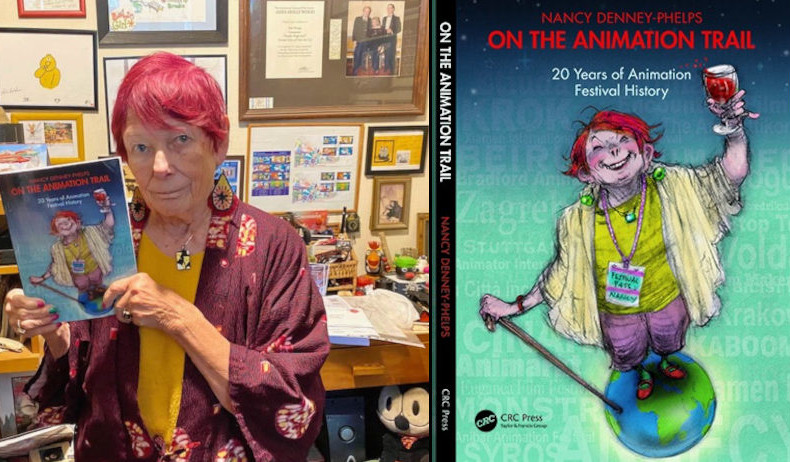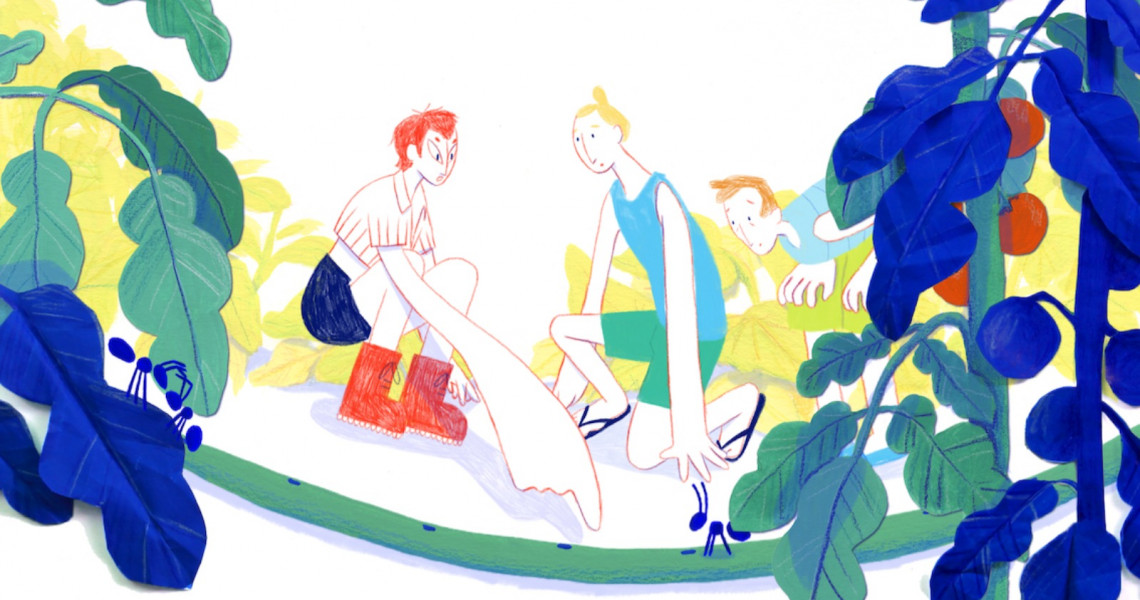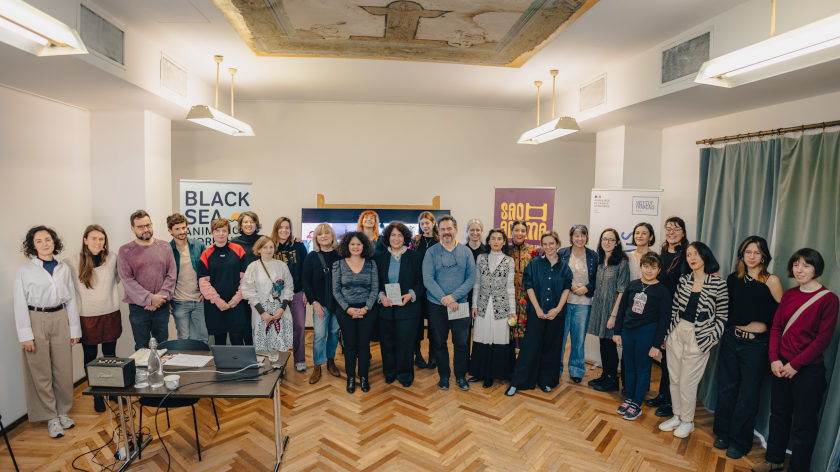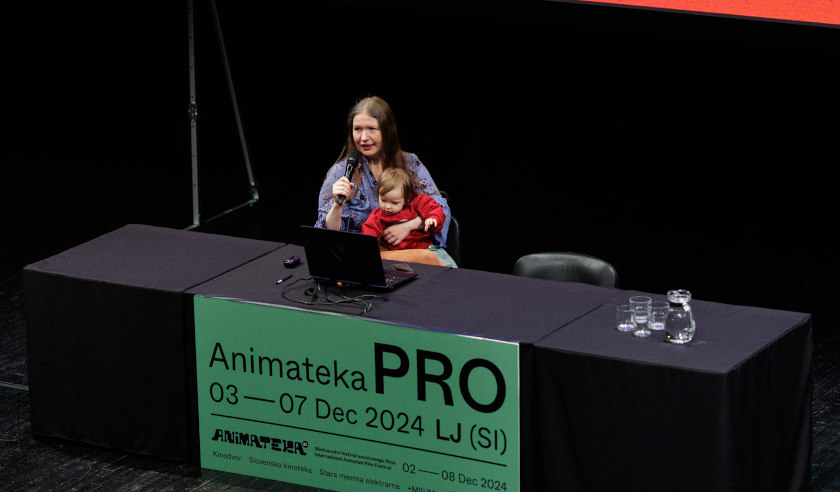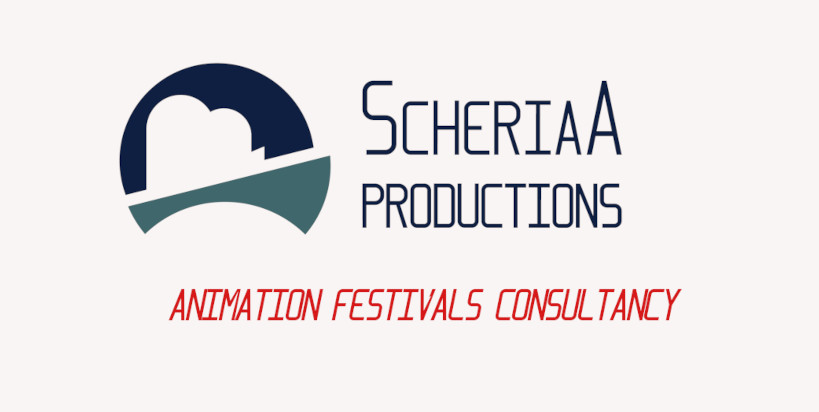On Touch(es) and Feel(s): Notes on the Etiuda & Anima 2022 Program
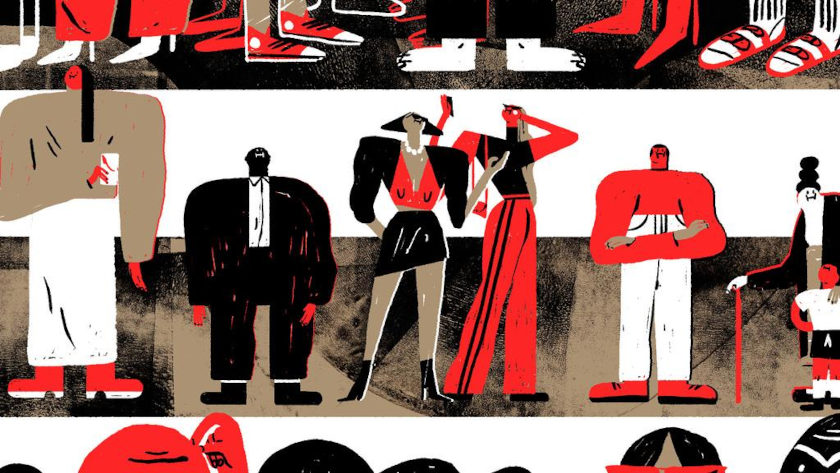
Etiuda & Anima Festival (this year: 29/11 - 4/12), it seems, dwells on the duality of sorts, as the very name already hints: debuts and animation in one package, albeit separated within; students and grown-up profs on equal terms in animation competitions; and, yes, there are actually two of those, international and domestic. It goes late in the season; so, a rich field of selection, along with maybe some challenges in the competitive, fist-night-right, edge.
The international section freely accommodates more or less known or recognized already entries; another challenge for the jury, perhaps.
My personal filter in the midst of this day and age, still, cannot help it, is tuned preferentially to what's relatable to, if not directly relevant to the zeitgeist, or shall we say, justifiable in the greater scheme of things.
In the (murky) light of the day, also certain geo-political-historical background somehow actualizes surfacing into the context, even if semi-submerged. Thus, for instance, in the Grand Prix winner ‘Koerkorter / Dog-Apartment’ (dir. Priit Tender, Estonia 2022) not only “A long-suffering man struggles with the difficulties of living in a surreal world”, as jury justifies, but this very ‘world’, carries along, to my eye, rather telling connotations, if a bit oblique: memory, maybe already semi-subconscious, of the Soviet surreal enough everyday flow, dilapidating mess as the state of things or at least of mind and perception. And if so, the estrangement in style here feels ‘motivated’ and in that moreover transparent. And this more directly applies to another Estonian entry, ‘Taaskohtumine / Til we Meet Again’, (dir. Ülo Pikkov, Estonia 2022) – in tender-sad nostalgia of the things past (figuratively and literally-tangibly at once) over and through the entire Soviet-rule decades, for those exiled from the native land-island. Now, after the geological era turned, they would come to visit and recollect – in the shapes, for-real, of stones and leaves, and feathers. All the materials are exactly from this deprived of native inhabitants piece of land, as the director sees fit to mention in the credits. And then he treats them as an artistic texture and plays it in and out with a deep sense of puppeteering, while transforming inevitable and unabashed awkwardness into yet another, more immediately motivated-justified estrangement, up, probably, to animadoc of an idiosyncratic variety.
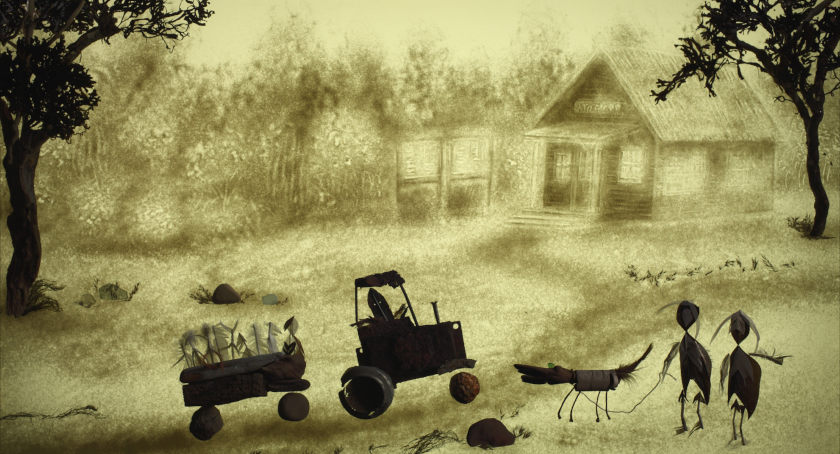
Til We Meet Again
In more conventional, full-fledged animadoc ‘Było sobie morze… / Once There Was a Sea…’ (dir. Joanna Kozuch, Poland, Slovakia 2021 – also stands in Polish competition) – awards from the Artistic Director Bogusław Zmudziński, student jury and, if surprisingly, the audience – similar background catches not just my eye, but ear: characters-witnesses speak mostly Russian – well, no big wonder, for lost in the midst of Central Asia former outskirts of the crumbling into disappearance imperial body, like this evaporated body of water, formerly known as the Aral Sea. We deal here, in fact, not with ecological catastrophe alone, but with cracks of historical geography as well. This film touched my nerve as a whole too, rather unexpectedly, must admit, since its look and move are generally pretty far from stylistic experimentation, not to say old-fashioned, but in that so clear and grounded, and persistent, that becomes in turn reservedly stylish. And reveals the message and feel through down-to-earth, true documentary metaphors: when the customs officer at the exit would with off-screen cynically polite interrogation delete one by one photos in the director/narrator's camera – stylized-ephemeral snapshots-documents – this somehow legitimizes anew exactly animadoc as method and the very genre, especially when and if it manages to touch and feel for-real human condition in a broader and individual-tangible sense.
And then, I couldn’t overlook, say, “Dealing with war’ (dir. Andreas Hykade, Germany 2022) – an already known miniature by a well-known master in his well-recognizable manner (alright, one of those in his diapason) – sharp and on the mark, as a social parabola should go, but… how shall I put it… maybe too generic in common abstract pacifism (akin, in fact, to many examples in this vein, in deep and recent animation history, which I kind of took to study through the last dark months) to echo in full what we're actually dealing with day in and day out. Not quite so, strangely or not, is dealing with almost the same, or rather with the dark fog of the battle, and in that with the feel of it, 'Niemandsland' (dir. Michael Blake, UK 2022) – another miniature, this time of a student's hand, as if a drafty sketch sublimes into the whole blackening graphic-montage fugue of/from hell, that is from, supposedly, gas infested tranches of WW1, but by extension, and pretty powerfully –of the deadly insanity of the war as such, and the one at hand.
Nevertheless, certain films, further from hot and gloomy actuality, still could and did, for me, bring up truly relevant meaning and existential feel on their own, even pure artistic terms. Nata Metlukh continues her line of witty-insightful formal exercises in 'Regular' (USA, Ukraine 2022), this time playfully exploring graphic-design toolbox, in particular, presumably fonts as shapes for all and everything: in a touch the entire screen world turns bold-wide-italic and such, thus going into a crazy mess until the 'regulator'-boy with a straitening bar restores the order in proper healthy variety. A breath of constructive optimism, for a change, at the least.
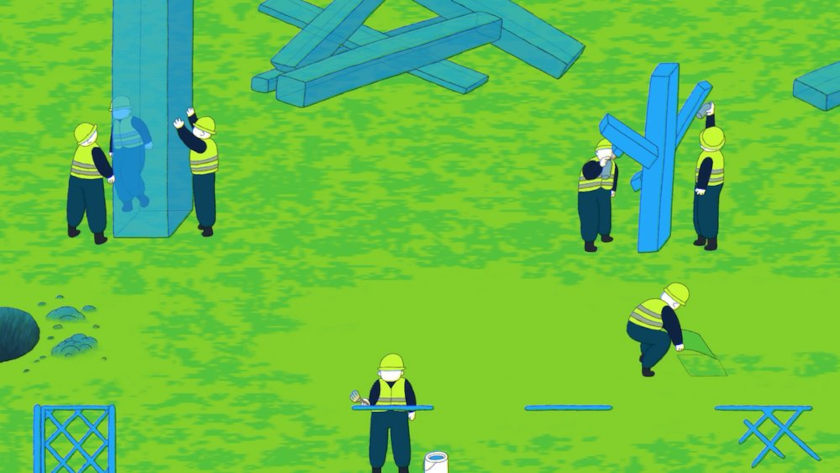
Regular
The most striking impression, though, gave me yet another seemingly formal exercise, a student film ‘Please Don't Touch’ (dir. Capucine Gougelet, France 2021). On the surface, a comedic piece, reportedly based on real-life anecdotes from museum visitations, with humble laconic synopsis: "Museum rules are simple: don't run, don't touch, don't shout and never disobey" – which to me underplays the true ambition. One can find here rather a deeply ironic, yet thoughtful, take on the museum as an institution and on modern art at large as a cultural construct – in bravely simple and bold strokes and moves; the very space, of the museum and filmic frame alike, is being questioned and played, even to complete desolving in the ‘white square’ of sorts, as are the related social practices-habits-experiences. And with that, the sense and meaning of touch and contact, and feel, even if is paid for with your own careless finger – as one of key scenes plays with dry, if darkish, humor, – drops of blood for admission price or rite of passage.
Polish competition program overall looked strongly interesting, in quite various manifestations: from more traditional, like tenderly-painterly drawn ‘Ole Śpijsłodko / Ole-Luk-Oie’ (dir. Joanna Jasińska-Koronkiewicz, Poland 2021), to more edgy-modern, like dramatic snapshots montage in 'On Time' (dir. Zbigniew Czapla, Poland 2021); with many shades in between.
Would wholeheartedly agree with the jury choice: ‘3 geNARRACJE / 3 geNARRATIONS’ (dir. Paulina Ziółkowska, Poland 2021) is definitely on top; and confess – one of my most favorite for some time already and close to heart; to leave alone its remarkably brave and sure-handed risky moves in stylistics: almost syncopated rhythm and flickering proportions-dimensions-angles… -moreover that in a student, then, film. To jury formulation: "For a beautiful original poem captured in a female dance of generations, telling about tenderness, passion and fear", I'd add, though, that the pan-play in the title indeed hints at a deeper sense of generational narratives as marks of historical destinies, a touch of existential experience as broader heritage-baggage, collective (cross-cultural) memory, which I feel that can share too in a way.
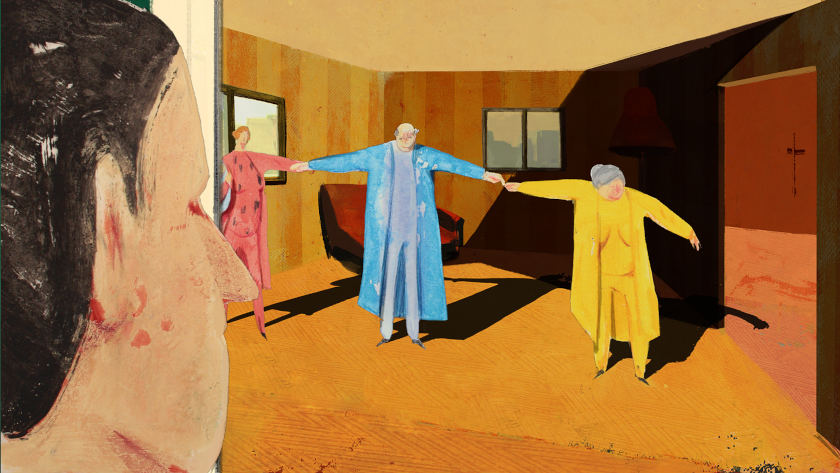
3geNARRATIONS
And I'm again at one with the artistic director's choice for 'Twierdza / Fortress’ (dir. Sławek Zalewski, Poland 2021): a dystopian methodical mess of a life, in correspondingly messy over-dense expressive graphics; might seem too slow, old-schoolishly talkative in voice-over narration, maybe a bit anachronistic – until you realize that the plotline and text are of Sławomir Mrożek, his short story 'The Chronicle of a Besieged City', dating as far back as 1957. The classic of absurdist drama, it appears, could see far forward into long-lasting absurd, indeed; right into never-dying induced electricity of ‘besieged psychology’, engulfing this quasi-stoic or faky-heroic mode of existence here; for us to touch and feel ever poisonous mythology behind it.
In this kind of light, or darkness, again, cannot overlook also ‘Pociąg specjalny / Train Insane’ (dir. Andrzej Zaręba, Poland 2022) where (un)usual suspects of historical doom and gloom, from Lenin to Trotsky to Stalin, along with others of their ilk and retinue, go into a wild-wild ride through and beyond (their) time and space. An unabashed pastiche in rough, as if drafty-draft drawings, collaging-colliding all and everything, dug out of the treasuries-sinkholes of conspiracy myths and long-tales, into truly insane, yet funny make-belief. Thus inviting us again and again to a rendezvous with an ever-lasting, never-dying, apparently, spell of history. Well, to start reflecting on it, in any form, is never late, isn’t it; pity that can hardly imagine anything of this particular kind on the native soil of those gloomy colorful figures nowadays.
Finally, on a different plane. There was also a screening of works by Marcin Giżycki, who had recently passed away – sad-sad; a farewell, unveiling a passion and gift for true original filmmaking under the academic skin. On one of those films, arguably the strongest, I happened to say a few words in my Annecy 2020 review:
And in ‘Wieczór/Sunset’ (dir. Marcin Gizycki, Poland – Off-Limits), a renowned scholar and festival director gives yet another lesson – introducing a specific angle, or maybe opening up a certain sub-genre of 'critical' filmmaking: inspired by the farther-figure of Polish animated industry Zenon Wasilewski (and probably by the dichotomy of his stylistic choices- options in films vs. personal painting), he offers, with an exquisitely minimalist touch, a peculiar method of film restoration – through restoring, imaginatively reconstructing the possibilities, albeit never realized, but nevertheless so tangibly close, so rich in potential impact… thus, perhaps, offering, in fact, a way of creative realignment of the art-form history per se.
One more touch to feel, an important one personally, and maybe not only.
contributed by: Mikhail Gurevich
Central photo: ‘Please Don't Touch’, dir. Capucine Gougelet. The 29th Etiuda & Anima Festival took place 29 November - 4 December in Krakow, Poland.




